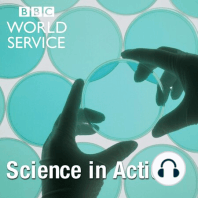26 min listen
World’s first DNA Covid vaccine
ratings:
Length:
37 minutes
Released:
Aug 26, 2021
Format:
Podcast episode
Description
Indian authorities have approved the world’s first DNA-based covid vaccine for emergency use. Not all the data that has led to the opening of the phase 3 trials is yet publicly available, but as public health policy expert Chandrakant Lahariya explains to Roland, it could be a real help in India’s, and the world’s, fight to get things under control.
The origins of the Covid virus were investigated last winter by a WHO team sent to Wuhan – where the first cases were discovered – earlier this year. Their work has since become the subject of intense political scrutiny and some criticism. This week, members of the team including Marian Koopmans have written a rebuttal, setting out the original terms of the investigation and urging the continuation of the process, as she explains to Victoria Gill.
Most of the science written by people from or about the African continent is written in English. Many local African languages do not currently have a meaningful vocabulary for many of the scientific terms and concepts researchers use. This week a team of scientists, journalists, and translators are completing the launch of a project called Decolonise Science, which will take 180 nominated papers posted on the website AfricaArxiv, translate them into 6 African languages including isiZulu, Sothu, and Hausa, and then use Machine Learning methods to build resources for science communication and education in people’s home languages. Project partner Sibusiso Byela explains the thinking.
This week the UK’s Royal Society announced its annual awards. Kenya’s George Warimwe has taken the Africa Award for his work creating vaccines for a virus that creates disease in livestock and humans – Rift Valley Fever. His promising approach stems from years of working with adenovirus technology akin to the AstraZeneca covid virus. But as he explains, his One Health approach is to learn from the immune response in humans and apply it to animals, and vice-versa. The grant associated with the award should also help him and his team pick- up on research left-off before the coronavirus pandemic.
(Image: Getty Images)
Presenter: Roland Pease
Producer: Alex Mansfield
The origins of the Covid virus were investigated last winter by a WHO team sent to Wuhan – where the first cases were discovered – earlier this year. Their work has since become the subject of intense political scrutiny and some criticism. This week, members of the team including Marian Koopmans have written a rebuttal, setting out the original terms of the investigation and urging the continuation of the process, as she explains to Victoria Gill.
Most of the science written by people from or about the African continent is written in English. Many local African languages do not currently have a meaningful vocabulary for many of the scientific terms and concepts researchers use. This week a team of scientists, journalists, and translators are completing the launch of a project called Decolonise Science, which will take 180 nominated papers posted on the website AfricaArxiv, translate them into 6 African languages including isiZulu, Sothu, and Hausa, and then use Machine Learning methods to build resources for science communication and education in people’s home languages. Project partner Sibusiso Byela explains the thinking.
This week the UK’s Royal Society announced its annual awards. Kenya’s George Warimwe has taken the Africa Award for his work creating vaccines for a virus that creates disease in livestock and humans – Rift Valley Fever. His promising approach stems from years of working with adenovirus technology akin to the AstraZeneca covid virus. But as he explains, his One Health approach is to learn from the immune response in humans and apply it to animals, and vice-versa. The grant associated with the award should also help him and his team pick- up on research left-off before the coronavirus pandemic.
(Image: Getty Images)
Presenter: Roland Pease
Producer: Alex Mansfield
Released:
Aug 26, 2021
Format:
Podcast episode
Titles in the series (100)
Keeping tabs on nuclear weapons: Can science overcome the political impasse in nuclear proliferation policy? by Science In Action
